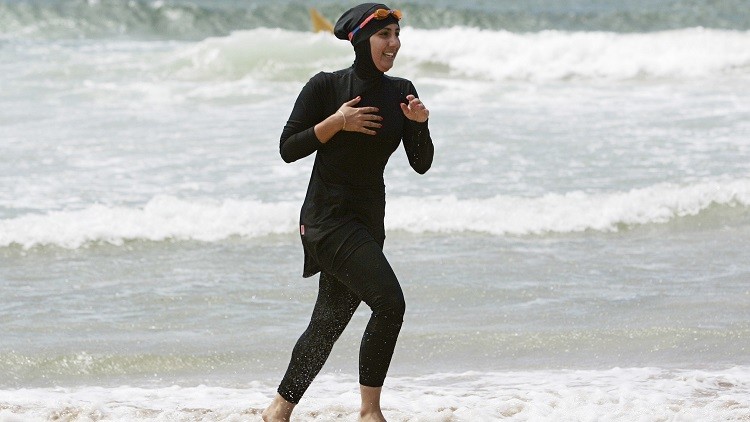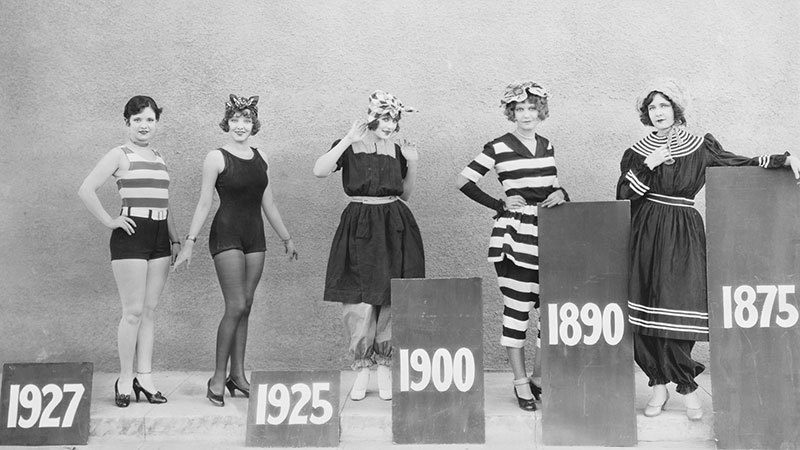I am stunned: How can France, the land of freedom of expression, wage a war against burkinis? What happened to tolerance? What happened to individual freedom and allowing people to dress as they please? Surely a woman wearing a burkini is no security threat, where would she hide the bombs?
In short, what’s the problem with burkinis? They’ve been around a long, long time except nobody called them “burkinis”…
A decade ago, in April 2005 to be exact, I painted one such woman wearing a strange green outfit on the Gaza public beach:
 IN THE PHOTO: Palestinian women going to the beach, Gaza (2005) PHOTO CREDIT: Oil on Canvas, Claude Forthomme, 120 cm x 70 cm
IN THE PHOTO: Palestinian women going to the beach, Gaza (2005) PHOTO CREDIT: Oil on Canvas, Claude Forthomme, 120 cm x 70 cm
In fact, the woman on the left is in a home-made burkini before anyone called them that…And you could say that our great-grandmothers, who covered themselves up when they went bathing, also wore a form of ante-litteram burkinis:
IN THE PHOTO: Vintage Bathing Suits | Bathing-Suit-Women-in-bathing-suits-on-Collaroy-Beach-1908 PHOTO CREDIT: Deby Clark
So what happened to the idea that France was the cradle of freedom, the leader of human rights? What happened to French exceptionalism?
It’s true that France is exceptional in one way: Unlike the rest of the world, France insists on “laïcité“, a term difficult to translate. Essentially, it is a concept with deep historic roots, inherited from the French Revolution that rose in 1789 against the monarchy and nobility but also against the Catholic Church seen as defending the king. It is inscribed in Article 1 of the French constitution that formally says that France is an “indivisible, secular (“laïque”), democratic and social” republic.
Related Article: “WHAT IS STOPPING US FROM BREAKING THE GLASS CEILING?“
For the French, it is imperative that religion be kept out of the public space.
The subject became highly emotional this summer in France after the horrendous Bastille Day massacre (14 July) on the Promenade des Anglais in Nice, where an ISIS supporter of Tunisian origin deliberately drove a 19-ton truck into the crowd, killing 86 people and injuring 434.
France’s reaction was predictable: three days of national mourning were announced, the state of emergency was extended until January 2017 and French military attacks on ISIS in Syria were intensified. There were reactions in the cultural and sports spheres as well, including the cancellation of Rihanna’s 15 July concert in Nice and the 20th Nice Jazz Festival; the European Cycling Union moved its European Road Championship event away from Nice to northwestern France. Predictably, the Nice municipality also reacted by closing the Promenade des Anglais and a number of public beaches.
And the ban on burkinis, already instituted in several French cities in 2016 was quickly adopted by the Nice municipality and several others in the region.
A Bleak Summer for the French Tourist Industry
All this clearly hurt tourism, already suffering from the January and November terrorist attacks in Paris. Other 2016 terrorist events in Europe did not help, one in Belgium (22 March, 35 killed including the three attackers) and another in Turkey (28 June, 48 killed, including the three attackers), not to mention the July failed coup in Ankara.
As a result, the summer of 2016 has been particularly bleak for French tourism. While long-haul travel to Europe has decreased this summer by 0.9% in sharp contrast to the 6.5% annual growth it had enjoyed in the last five years, France, and the French Riviera have been hard hit. All the numbers are not yet in, but data for the whole of the French hotel industry shows a drop of 13% in the second-quarter RevPAR (revenue per available room) from a year earlier, with room occupancy down about four percentage points. Radisson Blu Hotel Nice general manager told Travel Weekly that following the Nice attack, “there has been a huge impact on the entire Cote d’Azur region.” He estimated that Nice’s hotel room demand was 30% lower than a year ago.
What French tourism did not need was a ban on burkinis and the uproar it created abroad. Yet the local French saw it differently. Thierry Migoule, the head of near-by Cannes’ municipal services, explained it this way: “We are not talking about banning the wearing of religious symbols on the beach … but ostentatious clothing referring to an allegiance to terrorist movements that are at war with us.”
But this is carrying it one step too far. A burkini is not a religious declaration nor an assault on Christianity. And it is certainly not a way to show “allegiance to terrorist movements”. It’s just a traditional way of dressing, making Muslim women comfortable with their bodies, just as our grandmothers were when they went to the beach. Look at them in that photo, don’t they look happy and proud of their swimsuits? Why not let Muslim women feel the same?
A Different Approach to Cultural Integration
Another way of looking at this is to argue that France has another approach to minorities living in its midst. For example, in 2004, France introduced a ban on religious symbols in schools. That made the headscarves worn by Muslim women, the turbans of Sikh men, large Christian crosses and the Jewish Kippa all illegal. In 2007, full-face Islamic veils were banned from public places in France – in part for security reasons.
And this is where the link was made between terrorism and Muslim women’s wear. It created a mindset among the French, it set the stage for the uproar over burkinis.
The ban on burkinis has brought this punitive approach one step closer to intolerance: A climax of sorts was reached at the end of August when a couple of police officers forced a Muslim woman at the beach in Nice to… remove her clothing.
International reaction was swift, condemnation was general. On a site set up by the UK Guardian to debate the issue, some even spoke of a return to colonial times, writing that the “practice of imperial subjugation goes against women’s empowerment and should have no place in today’s society”. Indeed, no woman should be forced to undress in public and fined for wearing clothes in line with her faith.
For a full mindmap containing additional related articles and photos, visit #burkiniban
Setting aside for a moment the absurdity of burkini ban excesses, let’s look at what’s behind this prohibition.
It is something decidedly non-American and non-English: a totally different approach to the “integration” of cultural and ethnic minorities. Instead of letting them live in their own communities in complete independence, the French position is that anyone who has opted to settle down in France has to accept and adopt local customs. When in Rome, do as the Romans, as the saying goes, and when in France, do as the French.
A bikini is OK, a burkini is not.
But one may well wonder whether France has suddenly had a fit of Trump-like rejection of anything that is not “us”? Have the French forgotten how early Victorian swimwear for women looked like? Here’s a reminder – yes, fully covered, arms and legs and the head too:
 IN THE PHOTO: Women’s swimwear fashion in the 1860s. PHOTO CREDIT: Fashion Era.com, Pauline Weston Thomas, the Early Seaside Fashion History
IN THE PHOTO: Women’s swimwear fashion in the 1860s. PHOTO CREDIT: Fashion Era.com, Pauline Weston Thomas, the Early Seaside Fashion History
Fortunately, not all French people feel this way, and in August a French court overturned the ban on burkinis. What happened was this: the Council of State ruled to suspend a ban in Villeneuve-Loubet, a town near Nice and it is expected that this ruling will eventually apply to all municipalities that have adopted the ban (though it hasn’t happened yet).
The woman who is reported to have invented the burkini in the early 2000s, Aheda Zanetti, a Lebanese immigrant to Australia, would be pleased. After watching her young niece play netball in a traditional hijab, she was inspired to create a friendly sportswear for Muslim women. She saw this as a way to help them integrate better in Australian society, most of which is non-Muslim.
Because that is the whole point of the burkini: better integration in society. Go tell the French…
Recommended Reading: “WHAT’S NEXT FOR FRANCE AFTER BURKINI MADNESS?”
_ _













